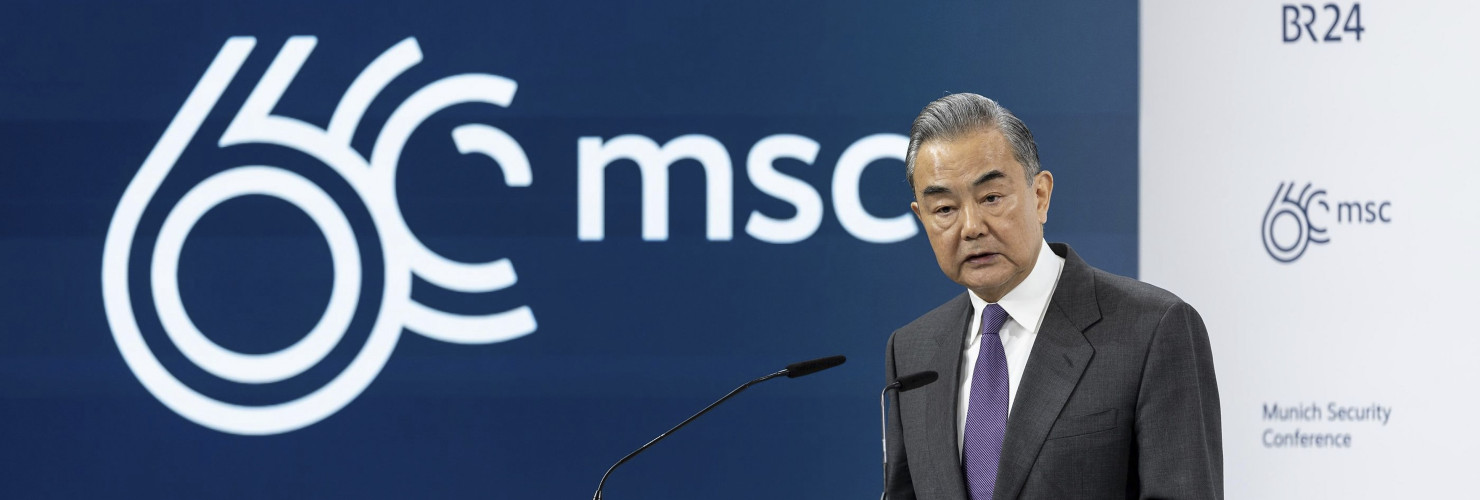

China and the Red Sea crisis + EU anti-forced labor instrument
Analysis
Red Sea crisis forces Europe to rethink engaging China – once again
By Helena Legarda
China’s role in international conflicts is in the spotlight as the second anniversary of Russia’s invasion of Ukraine nears. With the possible return of Donald Trump to the White House stoking fears of US isolationism, Beijing’s stance towards the war in Ukraine and the conflicts in the Middle East were live issues at this year’s Munich Security Conference – even if Europe continued to struggle to find a way to engage with China about it.
China may not have been the main focus, but the meeting of the world’s security-policy elite made one thing clear: Beijing’s continued support for Russia and its unwillingness to take a firm stance on the conflict in Gaza and the shipping crisis in the Red Sea are still key friction points in relations with the EU, the UK, the US, Canada and other countries that want Beijing to engage more proactively and responsibly.
Chinese Foreign Minister Wang Yi tried to assuage delegates in Munich by emphasizing he represented “a responsible major country” that would “keep its major principles and policies consistent and stable and serve as a staunch force for stability in a turbulent world.” But he did not find a very receptive audience at the Bayerischer Hof hotel.
Beijing’s inaction in the Red Sea crisis proved to be a sticking point in some of Wang’s bilateral meetings over the weekend. A number of US officials as well as the foreign ministers of Canada and the UK publicly called on Beijing to use its influence over Iran to rein in the Houthi militia in Yemen and stabilize the situation in the Red Sea.
Europe struggles to react
But European officials who met with Wang in Munich seem to have been less direct, if they raised the issue at all. This is a glaring omission given that three months of attacks on Red Sea shipping by the Iran-backed Houthis are taking their toll on Europe. Accounting for more than 40 percent of Europe’s trade with Asia and the Middle East, the disruption of the Red Sea trade route has raised shipping and insurance prices and delayed imports.
The Red Sea attacks, ostensibly launched to show Houthi solidarity with the Palestinians caught in the Gaza conflict, drew a swift response from Washington. It launched a naval operation to defend shipping in the area and conducted air strikes against Houthi targets in Yemen together with the UK. But Europe’s response has been slower to materialize.
It was only on February 19 that the EU launched its own maritime operation to help stabilize the region. The mission, called EUNAVFOR ASPIDES, is an important step for the EU in signaling the importance it assigns to the Red Sea maritime corridor. But with a purely defensive mandate, it is unlikely to have any significant impact. The EU has to continue pursuing political solutions to the crisis –and so must necessarily involve China.
EU response must consider China
Due to its close relationship with Tehran, China is considered to have enough leverage over Iran to pressure it to rein in the Houthis. Beijing should have an interest in doing so, as Red Sea disruptions have hit China’s trade as well. So far, however, it has been unable or unwilling to act. China has kept a counter-piracy taskforce of the People’s Liberation Army Navy posted out of the fray in the Gulf of Aden. Despite reports that Chinese officials pressed Iran to urge the Houthis to show restraint, the attacks continue unabated.
The Red Sea crisis has once more put Europe in the position of having to navigate China’s geopolitical positioning in an attempt to enlist its support. Its lack of progress in shifting China from its pro-Russian “neutrality” with regard to the war in Ukraine shows how difficult this may prove. But it is important that Europe continues to try finding ways to engage with China through productive conversations about these issues.
After two years of war in Ukraine, Europe should realize that China is unlikely to effectively mediate in the Red Sea or other conflicts. Beijing is largely unwilling to move beyond its own geopolitical considerations or to shoulder the responsibilities of an honest broker. Second, Europe should accept that splitting up China’s partnerships with “difficult” actors like Russia and Iran is very unlikely. These relations are underpinned by ideological and geopolitical objectives intimately linked to Beijing’s broader strategy.
The key question for the EU is currently whether Beijing can at least be convinced to influence its geopolitical partners involved in the situation to prevent further escalation. Munich again saw appeals to China’s sense of responsibility as a global power, but success remains elusive. This appears to be the result of a combination of factors. Beijing has little interest in crises that do not affect it directly and, when it comes to the Middle East, it wants to avoid falling in with the US in order to preserve its standing among Arab states.
Then again, Europe should also consider that Beijing’s influence in the region might be more limited than widely assumed. China does have economic leverage to put into play if it truly wanted to pressure Tehran (or Moscow) to act in a certain way. But such a step would also have negative consequences for China’s own struggling economy and for its global image. The cost-benefit analysis is a tough one for the Chinese leadership.
The best way forward for Europe might just be to try to reframe the conversation. Instead of pressuring China into acting in a way that undermines its own interests or appealing to its sense of responsibility, the EU should get more comfortable negotiating with China in a more transactional, interest-based manner. This would not be a fix-all solution, but it could lead to meaningful movement on the margins. It would help Europe to clearly identify its own interests and find trade-offs with China, or areas where compromise might be possible.
Read more:
- China’s Ministry of Foreign Affairs: A staunch force for stability in a turbulent world
- Foreign Policy: What the Red Sea Crisis reveals about China’s Middle East strategy
- Euronews: EU launches mission Aspides to protect Red Sea vessels from Houthi attacks
Update
There is life in the contemplated EU anti-forced labor instrument
The EU Council of member states on January 26 agreed a position on the anti-forced labor regulation, which aims to ban goods made with forced labor from the single market. This opens the way for negotiations with the European Commission and the European Parliament to agree on a final text for the regulation. With evidence about human-rights abuses and forced labor in China continuing to come to light, German corporate giant BASF announced it would be selling its share of a Xinjiang chemicals joint-venture.
What you need to know:
- Concerns can trigger an investigation. The regulation would authorize the European Commission to use civil-society submissions and its own research to build up a database on areas and products prone to the risk of forced labor. European authorities will be obliged to investigate if this leads to a reasonable suspicion of forced labor, including in third countries. Products found to have been made using forced labor will be banned from the single market. Cases involving third countries that refuse to co-operate will be decided by the Commission on evidence at hand.
- China is probably a main target. As it supplies huge amounts of goods to the EU and is suspected of helping to institute forced labor, China will likely be one of the main targets of the regulation. A UN report about Xinjiang published in August 2022 said there were “indications that labor and employment schemes appear to be discriminatory in nature or effect and to involve elements of coercion”. The region is a source of some critical raw materials, cotton and tomatoes. European imports of solar panels, batteries, textiles and tomato sauces could as a result be exposed.
- Europe adds another instrument against forced labor. A number of recent European regulations have tightened the screw on products made with the help of forced labor. In late 2023, corporate due diligence legislation was approved to make sure large companies do not violate human or environmental rights along their supply and production chains. Legislation has been passed that includes similar obligations for the battery-making and critical minerals industries.
Quick take: The Council, the Parliament and the Commission are in for difficult negotiations. But with the European Parliament election looming, heads of state and government and parliamentarians will be eager to demonstrate they can deliver. This may explain how an issue that had lost traction in 2023 is now back on the EU agenda. European firms with supply and value chains entrenched in Western China could come under much greater pressure to disinvest or find alternative suppliers. With Beijing impeding the work of foreign accounting firms in China, European companies also have problems getting their Chinese-made products certified free of forced labor.
Read more:
- European Council: Forced labour: Council adopts position to ban products made with forced labour on the EU market
- Euractiv: Solar PV industry caught up in China forced-labour controversy
- Politico: Forced labor still haunts China’s Xinjiang, report finds
- Reuters: BASF to exit joint ventures in China's Xinjiang amid rights-record scrutiny
Short takes
EU Indo-Pacific Forum and EU-ASEAN ministerial meeting in Brussels
The events involved around 70 delegations from the EU and Indo-Pacific states – although the US and China were left off the guest list. The EU pledged to further increase cooperation with countries in the region to maintain stability, boost trade and tackle climate change. Despite the meeting’s aim to highlight the importance of the Indo-Pacific for Europe, the foreign ministers of France and Germany skipped the event, while the Italian foreign minister attended only the EU-ASEAN ministerial meeting. Some of Europe’s main regional partners, including Japan and India, also sent lower-level officials.
- EEAS: Boosting EU-Indo-Pacific Partnerships: Chair’s Press Release following the EU Indo-Pacific Ministerial Forum
- European Council: EU-ASEAN ministerial meeting
Solar and shipbuilding producers put pressure on EU
Representatives of European photovoltaic manufacturers last month called on the European Commission to take immediate action to stop subsidized Chinese-made solar modules flooding the European market. Shipbuilders have voiced similar concerns, calling on the EU to make sure Chinese rivals compete fairly. They argue the demise of European shipbuilding would pose an economic-security risk.
- Politico: Shipbuilders ask for EU help on Chinese subsidies
- Politico: EU mulls emergency aid for collapsing solar producers
Germany, Italy stall EU supply chain law
An EU law obliging large companies to address risks to human rights and the environment within their supply chains has been postponed. Announced abstentions by Germany and Italy meant the legislation failed to secure the backing of a qualified majority of at least 15 member states representing 65 percent of the EU population. Critics of the law had argued it would increase bureaucracy and hurt businesses. Germany’s shift away from backing the law also highlights the divisions within the coalition government in Berlin.


